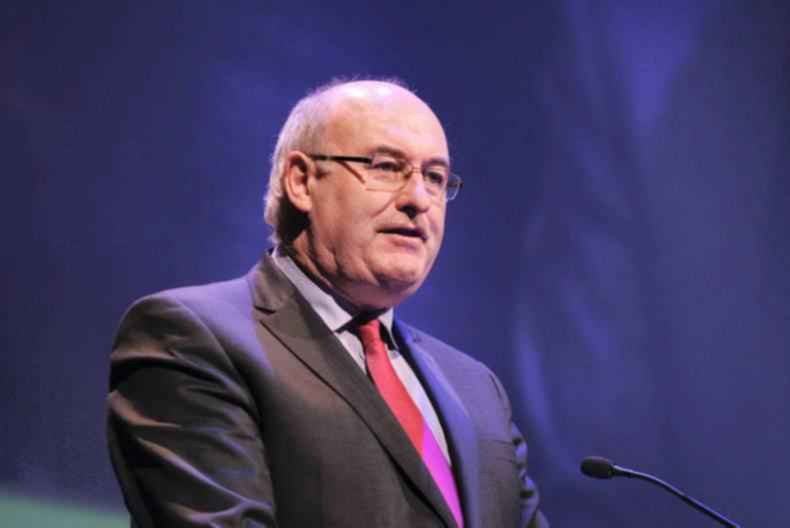Milk producers in Northern Ireland should not expect significant financial support from the EU Commission nor from the British government, any time soon.
That is apparent from official comments made in the past few days. These maintain the line that the authorities gave more than a year ago, when stressing that the EU now operates a ‘‘more market orientated policy’’ and they largely ignore the fact that the fall in prices is partly due to government decisions on foreign policy with regard to trade sanctions on Russia.
Whatever hype may be generated about the House of Commons Environment, Food and Rural Affairs (EFRA) Committee dairy report, which was released this week, it should be noted that one of the report’s conclusions is: ‘‘The farming Minister (George Eustice MP) rightly told us that long-term opportunities remain to be exploited by the UK’s dairy farmers, and we agree with Mr Eustice that while the Government can take steps to help, the dairy industry itself has a significant responsibility for its own future and is generally better placed than the Government is to lead change.’’
Another direct quote from the conclusion of the report states:
‘‘Nor is it the role of the Government, as Mr Eustice told us, to help individual businesses with cashflow problems.’’
Intervention prices
The EFRA committee has recommended that Defra seeks a commitment from the EU Agriculture Commissioner Phil Hogan that the current intervention price for milk of around 17p/litre be reviewed before the ending of milk quota arrangements in April 2015, and asks the UK Secretary of State to work with counterparts to keep the intervention price under regular review thereafter. But, back in November, the Ulster Farmers’ Union made the same plea to Defra secretary Liz Truss, who offered no support whatsoever for it.
Commenting this week, UFU president Ian Marshall welcomed the recommendation put forward by the committee. He pointed out that there is a meeting next week in Brussels, to review the EU milk package, which presents an ideal opportunity for the dairy industry to press for this review of the intervention price.
However, in Berlin last week, EU Agriculture and Rural Development Commissioner Phil Hogan said: “Forecasters may be right or they may be wrong. I will continue to monitor prices and markets. I will implement the support regime that exists. We have a market orientation policy agreed in 2013. Things will stabilise in the second half of 2015. I’m quite confident of that.
‘‘My job is to keep confidence in the industry. A year ago, it was the highest ever price for milk”.
Hogan said he expects many successes in expanding markets for dairy in Asia and other regions and added that he will be spending a considerable part of his time this year visiting those areas to promote the possibilities in those markets.
On the Russian embargo, the Commissioner said: ‘‘Clearly, it takes time to find alternative markets.’’ But he argued that the Commission has acted. He referred to aid to private storage of butter and milk powder and specific support for Finland and the three nearby member states of Estonia, Latvia and Lithuania, where the effect of the Russian ban was felt much more directly, in his view.
Hogan conceded that the milk price decline may be partly due to the Russian ban, but he said it is also due to steady increase in production in response to strong prices last year and with the ending of quota imminent some producers had also increased output.
“Producers must learn to read the market signals,” he said.
GCA ‘‘without teeth’’
The House of Commons EFRA committee has asked for a clear explanation of why the Groceries Code Adjudicator (GCA) has been left so long without the teeth she needs to do her job.
The committee believes that the terms under which this ‘‘supermarket ombudsman’’ is allowed to operate are too restrictive and that a means must be found to protect suppliers of products to major retailers by accepting complaints from direct and indirect suppliers.
They note that the GCA has not yet conducted an investigation and wants to see a statutory instrument laid within the remainder of this Parliament (before May). “We find it extraordinary that the Government has left the GCA for more than a year with no practical ability to use her legal powers.”
Competition issues
EU Commissioner for Agriculture and Rural Development, Phil Hogan, gave a solid performance at several meetings and press conferences during the International Green Week exhibition in Berlin last week. The Irish Farmers Journal asked Commissioner Hogan if he accepts that ‘‘own-label’’ branding of liquid milk by major retailers has been a big factor in undermining the prices available for milk and, if so, what is he going to do about it. In response, the Commissioner said that he had written to the EU Competition Directorate about issues of food chain competition and that he will be pursuing policy issues in relation to the power of retailers and the ability of producers to bargain collectively.
He said he will be seeking to increase producer bargaining power in the food area but declined to comment on liquid milk specifically. Hogan indicated that a detailed assessment is being made by economists within his directorate to assess the margins extracted in various parts of the milk supply chain (by retailers and processors).
Fertilizer prices put under scrutiny
Asked about fertilizer prices in relation to the large fall in prices of oil, Commissioner Hogan said that a 7% increase in fertilizer prices is not acceptable.
He said that he has written to the Competition Commissioner about it, adding: ‘‘It seems that I will be corresponding a lot with the Competition Commissioner.’’






 This is a subscriber-only article
This is a subscriber-only article










SHARING OPTIONS: